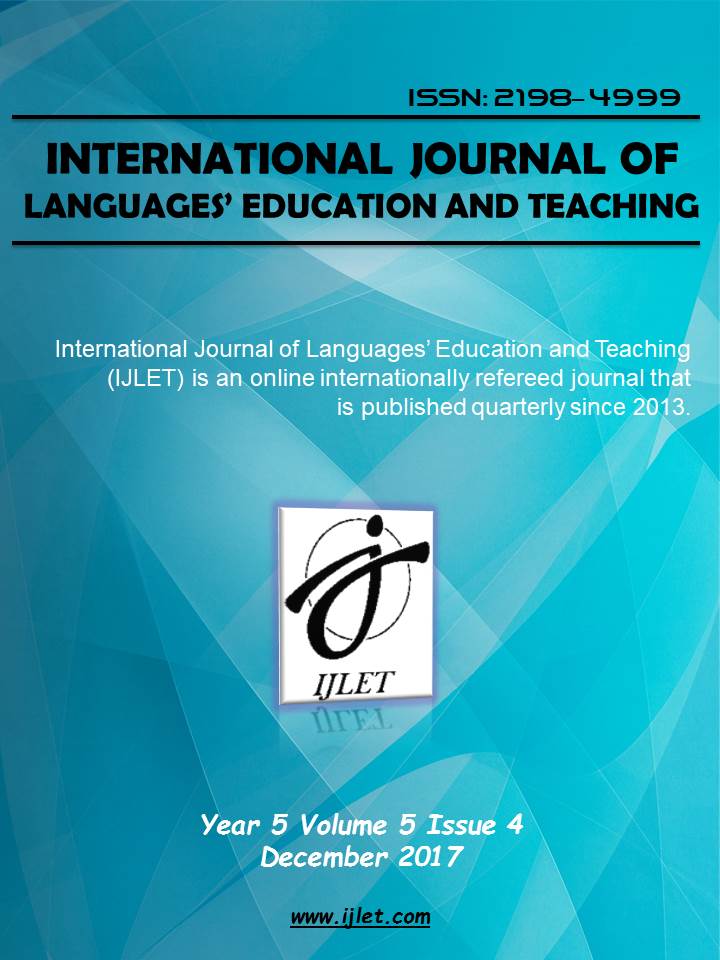Author :
Abstract
Keywords
Abstract
The main purpose of this qualitative study was to investigate university students' perceived failure attributions in learning English as a foreign language at a preparatory school. The participants were 118 undergraduate students who failed at the end of a preparatory year and had to attend the repeat program. Each participant was asked to write about their perceived causes of failure in learning English. Students' responses were analyzed based on Weiner's (1983, 1985) Attribution Theory, and the emerging themes were linked to the locus of control, stability and controllability dimensions. The qualitative nature of the study provided in-depth information about the content of each dimension. The results suggest that students mostly attributed their academic failure in learning English to external and uncontrollable factors, which are in line with the findings of similar studies conducted in other university settings.
Keywords
- 1. Augoustinos, M. (2005). Social cognition : An integrated introduction. New Delhi: Sage Publication.
- 1. Augoustinos, M. (2005). Social cognition : An integrated introduction. New Delhi: Sage Publication.
- 2. Banks, M. & Woolfson, L. (2008). Why do students think they fail? The relationship betweenattributions and academic self-perceptions. British Journal of Special Education, 35(1), 49-56. http://dx.doi.org/10.1111/j.1467-8578.2008.00360.x
- 3. Boruchovitch, E. (2004). A study of causal attributions for success and failure in mathematics amongBrazilian students. Interamerican Journal of Psychology, 38(1), 53-60. Retrieved from www.psicorip.org/Resumos/PerP/RIP/RIP036a0/RIP03807.
- 4. Brown, R. A., Gray, R. R., & Ferrara, M. S. (2005). Attributions for personality achievementoutcomes among Japanese, Chinese, and Turkish university students. Information and Communication Studies, 33, 1-13.
- 5. Bruning, R. H., Schraw, G. J., Nordby, M. M. & Ronning, R. R. (2004). Cognitive Psychology and Instruction (Fourth edition). Upper Saddle River, NJ: Pearson / Merrill Prentice Hall.
- 6. Dong, Y., Stupnisky, R. H. & Berry, J. C. (2013). Multiple causal attributions: An investigation ofcollege students learning a foreign language. European Journal of Psychology of Education, 28 (4), 1587- 1602.
- 7. Genç, G. (2016). Attributions to success and failure in English language learning: The effects ofgender, age and perceived success. European Journal of Education Studies, 2 (12), 25-43. Available at www.oapub.org/edu
- 8. Ghonsooly, B., Ghazinadeh, A., Ghazanfari, M. & Ghabanchi, Z. (2015). An exploration of EFL teachers’ attributions. European Journal of Teacher Education, 38 (3), 378-391.
- 9. Gobel, P. & Mori, S. (2007). Success and failure in the EFL classroom: Exploring students’ attributional beliefs in language learning. Euro SLA Yearbook, 7, 149-169.
- 10. Graham, S. J. (2004). Giving up on modern foreign languages? Students’ perceptions of learning French. The Modern Language Journal, 88, 171-191.
- 11. Lei, C. (2009). On causal attribution of academic achievement in college students. Asian Social Science, 5(8), 87-96. Retrieved from
- 12. Linder, F. & Janus, C. E. (1997). The relationship of locus of control to academic performanceamong dental students. Paper presented at the Annual Meeting of Eastern Educational Research Association, Hitton Head, Sc.
- 13. Mkumbo K., A. K. & Amani, J. (2012). Perceived university students’ attributions of their academic success and failure. Asian Social Science, 8(7), 247-255.
- 14. Özkardeş, A. (2011). Achievement attributions of preparatory class learners at the School of ForeignLanguages at Pamukkale University for their success or failure in learning English. Unpublished MA thesis, Pamukkale University, Denizli.
- 15. Paker, T. & Özkardeş-Döğüş, A. (2017). Achievement attributions of preparatory class learners in learning English. Journal of Language and Linguistic Studies, 13 (2), 109-135.
- 16. Peacock, M. (2009). Attribution and learning English as a foreign language. ELT Journal, 64 (2), 184- 193.
- 17. Şahinkarakaş, Ş. (2011). Young students’ success and failure attributions in language learning. Social Behaviour and Personalityity, 39 (7), 879-886.
- 18. Taskiran, A. (2010). Exploring EFL students‟ causal attributions of perceived success and failure in language learning process. Unpublished MA thesis, Anadolu University.
- 19. Thang, S. M., Gobel, P., Mohdnor, N. F. & Suppiah, V. L. (2011). Students’ attributions for successand failure in the learning of English as a second language: A comparison of undergraduates from six public universities in Malaysia. Pertanika Journal of Social Sciences & Humanities. 19 (2), 459-474.
- 20. Tse, L. (2000). Student perceptions of foreign language study: A qualitative analysis of foreign language autobiographies. Modern Language Journal, 84 (1), 69-84.
- 21. Ushioda, E. (2001). Language Learning at University: Exploring the role of motivational thinking.In Dörnyei, Z. Schmidt, R. (Eds.), Motivation and second language acquisition (pp. 93-126). Honolulu: University of Hawaii.
- 22. Weiner, B. (1983). Some methodological pitfalls in attributional research. Journal of Educational Psychology, 75, 530-543.
- 23. Weiner, B. (1985). An attributional theory of achievement motivation and emotion. Psychological Review, 92(4), 548-573.
- 24. Weiner, B. (1986). An attributional theory of achievement motivation and emotion. New York: Springer Verlag.
- 25. Weiner, B. (1990). History of motivational research in education. Journal of Educational Psychology. 82(4), 616-622.
- 26. Weiner, B. (1992). Human motivation: Metaphors, theories and research. Newbury Park, CA: Sage.
- 27. Weiner, B. (2000). Intrapersonality and interpersonality theories of motivation from an attributional perspective. Educational Psychology Review, 12 (1), 1-14.
- 28. Williams, M. & Burden, R. (1999). Students’ developing conceptions of themselves as language learners. The Modern Language Journal, 83 (2), 193-201.
- 29. Williams, M., Burden, R. & Al-Baharna, S. (2001). Making sense of success and failure: The role ofthe individual in motivation theory. In Dörnyei, Z. Schmidt, R. (Eds.), Motivation and second language acquisition (pp. 171-184). Honolulu: University of Hawaii.
- 30. Williams, M., Burden, R., Poulet, G. & Maun, I. (2004). Learners’ perceptions of their successes and failures in foreign language learning. Language Learning Journal, 30, 19-29.
